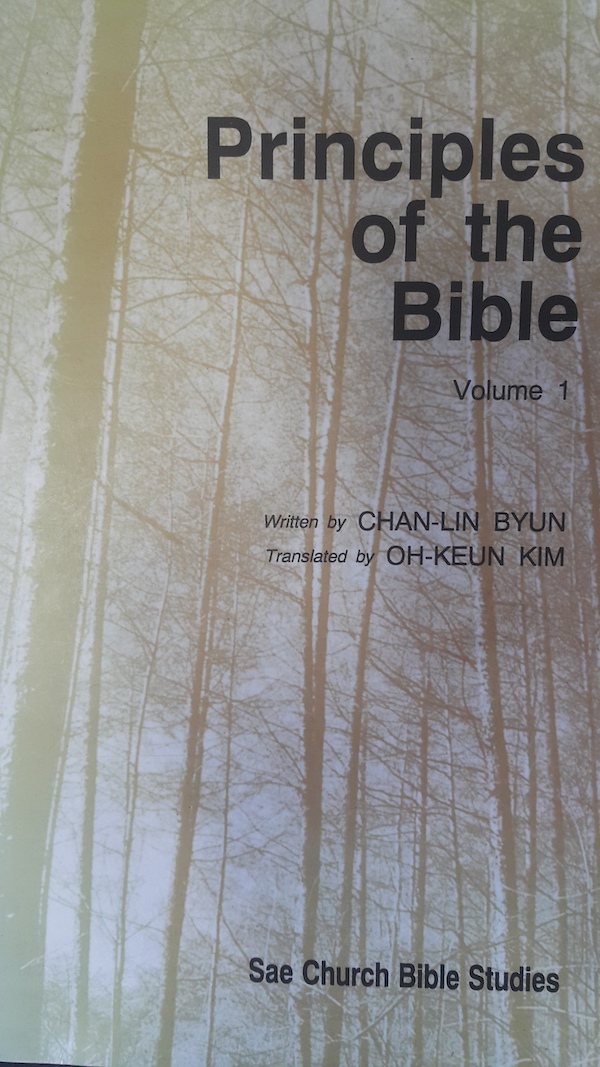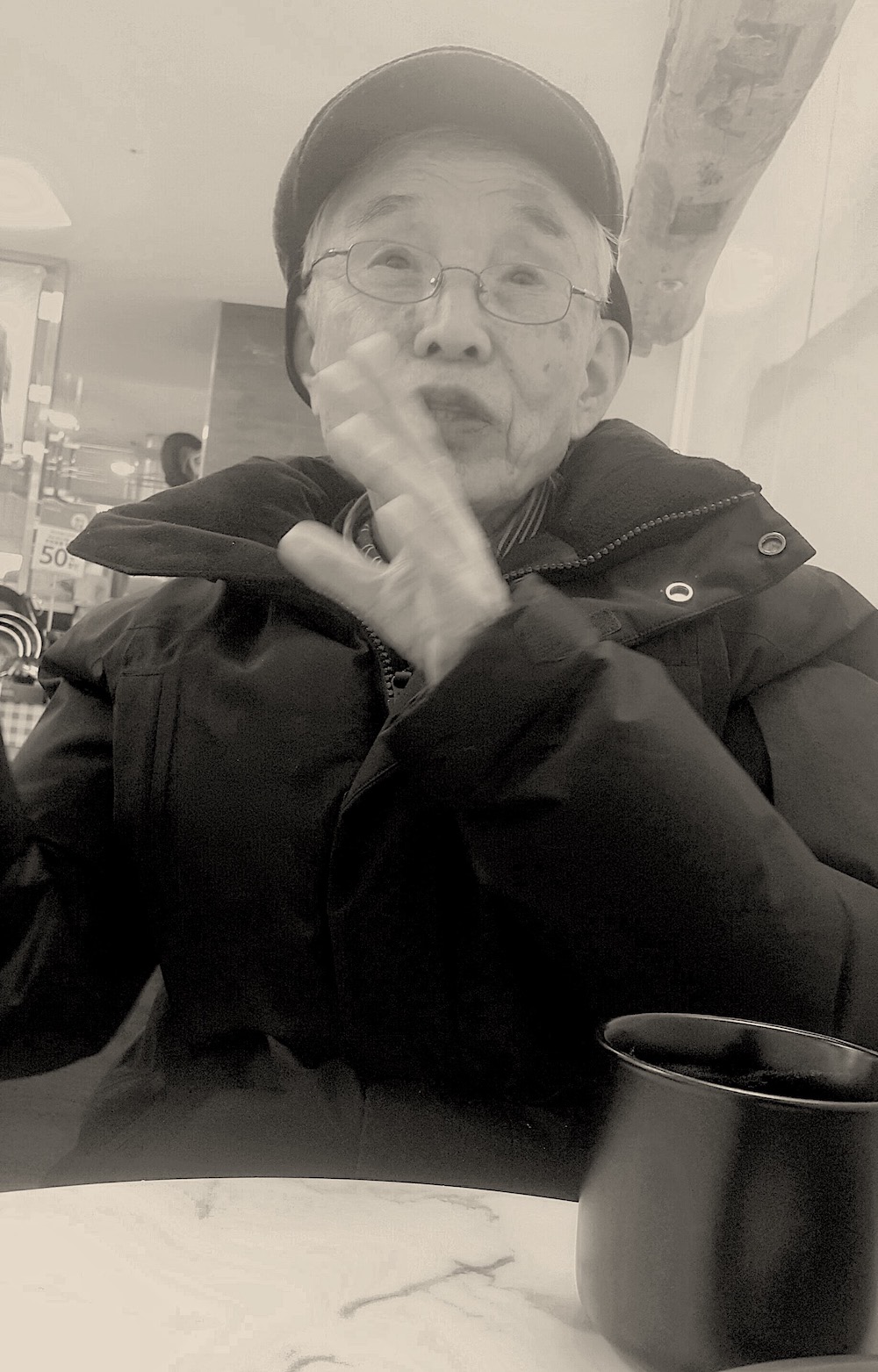변찬린 : 성경은 어느 특정 종교의 전용문서가 아닌 대도(大道)의 문서이다. 『성경의 원리』가 새 종교의 새벽을 예고하는 예루살렘의 홰쳐우는 닭소리가 되길 바란다. 빛은 동방으로부터 비칠 것이다.
유영모 : 대개의 종교 이름은 자신이 붙이는 것이 아니고 남이 붙여서 된 이름이 많은데 나를 보고 ‘바른소리치김(正音敎)’라고 해 준다면 싫어하지 않겠어요.
독창적인 한국의 종교적 영성이
보편적인 우주적 영성
두 종교인을 그리스도교의 선교신학과 성취론의 관점에서 평가한다면 한국의 독창적인 종교적 영성과 종교(신학)사상이 서구 그리스도교 문화의 부족한 점을 보충하는 보기론(補基論)에 불과할 뿐이다. 그러나 두 종교인의 사유체계는 그리스도교를 포월(包越)한 새로운 종교사상의 지평을 열고 있기 때문에 한국 종교와 세계 종교의 지평에서 자리매김되어야 한다.
변찬린은 유영모, 김교신 등 주체적인 성경해석을 한 종교인을 창조적으로 계승하고, 토착화 신학자의 문제의식에 공감하며, 그리스도교 신종교 계통의 종교사상에 대한 비판적 대안을 제시한다. 더욱 강조되어야 할 핵심은 희랍적 이원화로 형성된 서구 신학을 극복하려는 역사적 자의식으로 한국의 종교적 영성으로 『성경의 원리』 4부작을 저술하여 세계 종교 지평에서 보편화하려 시도했다는 점이다. 그는 성서를 18개로 범주화하여 조직신학적으로 해석한 『성경의 원리』(1979), 구약의 주요 인물과 사건을 해석한 『성경의 원리(중)』(1980), 신약의 주요인물과 사건을 해석한 『성경의 원리(하)』, 그리고 사후에 발간된 『요한계시록 신해』(1986)순으로 발간하고, 2019년 한국신학연구소에서 개정신판으로 전면 재발간되었다. 『성경의 원리』(1979 초판, 1988 재판, 1992 삼판, 2019 개정신판)는 “Principles of the Bible”로 영역(사진 참조)되어 하버드대 등 영미권의 주요 대학과 저명한 신학자에게 배포되었다.

▲ 변찬리, Principles of the Bible, 1995. ⓒ이호재 원장 제공
김상일 교수에 의하면 성서의 부활과 변화의 도맥에 대해 변찬린 만큼 시종일관 깊이 있게 해석한 것은 세계 신학계에서 최초라고 평가한 것을 이미 언급한 적이 있다. 또 한국종교문화 연구의 메카라 할 수 있는 한국종교문화연구소의 연구소장을 역임하였으며 현 이사인 윤승용은 변찬린의 한밝 성경해석학을 ‘한국기독교’의 해석 틀을 정초한 해석체계라고 평가하며 윤성범, 변선환 등 문화신학 그룹, 유영모 등과 같은 주체적인 성경해석 그룹, 영통 계시에 의한 그리스도교계 신종교 그룹 등의 종합된 신학 사상이라고 소개하며 “우리의 삶의 현장을 고려한 주체적 신학담론을 형성하고 있다는 점에서 그리고 미래 인류의 생명과 문명을 고려한 생명신학이라는 점에서 우리의 삶의 현장 신학이고, 새로운 축의 시대를 대비하는 인류 미래신학으로도 손색이 없다”고 평가한다.(1)
한편 유영모에 대해서는 이정배 교수가
『없이 계신 하느님, 덜 없는 인간』(2009), 『빈탕한데 맞혀놀이』(2011)라는 저서를 통해 유영모 신학을 재구성하여 세간에 선보였다. 김흡영 교수는 세계 신학계에 한국신학의 자리매김을 위해 『가온찍기』(2013)로 다석신학을 조명하며 ‘도의 신학’의 한 사례로서 다석신학을 영미권에 소개하고 있다. 또한 2008년 서울에서 개최된 세계 철학자대회에서 유영모와 함석헌이 한국을 대표하는 철학자로 소개된 것은 잘 알려진 사실이다.
두 종교인은 성서 및 동서양의 경전에 대한 독창적인 인식을 가지고 있다. 변찬린은 “성경은 특정 종교의 전용문서가 아닌 대도(大道)의 문서이다”라고 선언한다. 이런 바탕으로 “성경을 성경으로 해석한다”라는 원칙을 가지고 다종교적 경전과 간텍스트적 해석, 다학제적 방법론을 성서해석에 적용한다. 또한 유영모는 “내 말은 이 세상에 쓸모가 없다”, “예수만이 말씀으로 된게 아니다. 개똥조차도 말씀으로 되었다. (중략) 나는 말씀밖에는 아무것도 안 믿는다. 기독교만 말씀이 아니다. 불교도 마찬가지 말씀이다”라고 하며 말씀 중심의 깨달음을 『다석일지』와 강의록으로 남기고 있다. 두 종교인은 한국의 경전읽기 독창성을 바탕으로 우주적 몸으로 경전을 회통하여 보편성을 가진 언어로 재창조해 낸다.
유영모의 『다석일지』와 강의는 김흡영 교수가 말하듯이 “다석의 독창적인 신학 사상을 현대 조직신학의 범주와 잣대에서 체계화systematize 하는 작업 자체가 범주착오적 오류일 수 있다”는 선교신학적 오류를 잘 지적하고 있다. 다시 말하면 유영모와 변찬린의 경전읽기는 성서해석이라는 관점에 국한해서만 이해하더라도 이미 서구신학을 극복하고 한국의 독창적 영성으로 새로운 경전읽기의 모범을 보여주고 있다. 김흡영 교수는 세계신학계를 향해 핫지슨(Peter C. Hodgson)의 구성신학적 방법(2)을 이용해 조직신학적으로 다석신학을 재구성해 냈지만(3) 변찬린은 성서텍스트를 다종교적 언어, 간텍스트적 해석과 다학문적 방법을 이용하여 당대인과 소통할 수 있는 언어로 선교신학의 한계를 극복하였다.
그럼에도 다석의 제자이자 개신교 목사의 종교적 정체성을 가진 김흥호의 『다석일지』 해설서인 『다석일지공부』는 김흥호의 직관적인 깨달음의 해설과 그리스도교의 환원적인 사유적 해석의 입장에서 다석을 해설하고 있다. 김흥호는 『다석일지』를 이렇게 평가한다.
우리는 지금 『다석일지』에 적힌 삼천 수나 되는 시나 시조를 읽으면서 (중략) 이 시조들이 성경 어느 말씀과 연관되는지를 알 수 없다는 사실이다. 참으로 한이 된다. 성경 말씀을 읽고 한 말들이니 다시 이 말을 생각하여 성경 말씀까지 찾아 들어갈 수 있으면 얼마나 행복할까? 『성경』 말씀의 변형이 선생의 시와 시조라고 생각할 수 있다. 성경 말씀의 한국화(韓國化)가 『다석일지』이다.(4)
유영모는 성서만이 아니라 다양한 경전을 읽었으며, 그 깨달음을 한시와 독창적인 한글 언어 등으로 『다석일지』에 기록하였음은 잘 알려진 사실이다. 개신교 목사로서 호교론적인 사유가 『다석일지』의 해설서인 『다석일지공부』에 선 반영되어 있음을 후학은 경계해야 한다. 바로 이 지점이 또 다른 제자 박영호와 대척점을 이루는 부분이기도 하다. 박영호는 “김흥호가 목사가 되고자 신학을 공부하러 가다니, 어미 닭이 오리 새끼를 깬 것과 같이 어이가 없었다”라고 평한다. 스승 유영모와 제자 김흥호와 박영호의 사유체계의 차별성이 드러나는 대목이다.
이정배 교수의 제안대로 불교에 중점을 둔 교토학파를 염두에 두고 유영모를 중심으로 함석헌, 김흥호와 박영호, 이기상 교수 등 다석연구자로 ‘다석학파’를 형성하려 한다면 선교신학의 입장을 뛰어넘는 새로운 관점을 가져야 한다. 그러나 현재 유영모와 함석헌을 균형 있게 연구한 결과는 박재순 교수가 있을 뿐이다. 아직도 유영모의 직계 제자인 박영호가 정확한 기억력으로 유영모를 증언하고 있다. 제자가 생존해 있을 때 이런 종교신학프로젝트가 다양한 전공의 연구자가 참가하여 성공리에 진행되기를 바란다.
유영모와 변찬린은 그리스도교의 사유체계를 포월(包越)하여 한국적 지평에서 인류 정신문명사에서 보편화할 수 있는 ‘포월적 상생’의 사유점을 발견하였다. ‘이 포월적 상생’의 준거점이 변찬린의 언어로는 한민족의 종교적 원형인 ‘선맥과 풍류’의 발견이고, 유영모의 언어로는 ‘가온찍기’를 하고 ‘빈탕한데 맞혀놀이’를 한다는 것이다. 포월적 중심은 ‘선맥의 가온찍기’이고, 상생의 큰 원은 ‘풍류로서 빈탕한데 맞혀놀이’을 하는 우주적 궤적이다. 이 지점을 놓치면 한국신학의 세계화 작업은 중심없이 원을 그리며 서구신학의 대리전을 치르는 꼴이 되기 십상이다.
유영모의 바른소리치김(正音敎)
‘바른 소리’와 ‘정음(正音)’에 대해서는 유영모 연구자가 상당히 주목하고 있지만 “바른소리치김(正音敎)”에 대해서는 그다지 관심을 가지지 않는다. 유영모는 자신의 가르침을 ‘정음교(正音敎)’로 불러주기를 바란 적이 있으며, 함석헌도 ‘새 시대에는 새 종교’가 나와야 한다는 탈 그리스도교적 사유를 하고 있다. 유영모의 직계제자인 박영호는 유영모가 이미 특정 종교에 얽매인 사유를 하지 않았다는 방증이자, 유영모의 종교사상을 조명하는데 중요한 단서가 되는 말을 기록으로 남겨놓고 있다.
대개의 종교 이름은 자신이 붙이는 것이 아니고 남이 붙여서 된 이름이 많은데 나를 보고 ‘바른소리치김(正音敎)’라고 해 준다면 싫어하지 않겠어요.(5)
필자는 2015년 변찬린과 유영모의 관계를 연구하기 위해 박영호 선생을 종로 5가에서 처음 만난 후 수년 간 여러 차례에 걸쳐 ‘정음교(正音敎)’의 실체가 학술정보로서 가치가 있는지 다각적으로 조사한 바 있다. 박영호 선생은 의식하였는지 모르지만 필자는 연구자의 입장에서 유사한 질문을 다양한 관점에서 조사한 결과를 처음으로 에큐메니안에 공개한다.


▲ 2019. 12. 5, 필자와 대담 중 ⓒ이호재 원장 제공
박영호는 필자와의 인터뷰에서 다음과 같이 말한다. 1971년경 『씨알의 소리』 편집장을 역임한 전덕용은 함석헌이 『씨알의 소리』가 1, 2호 발간되고 폐간된 후 (함석헌은 해외여행을 떠났을 때) 전덕용의 초청으로 구기동에 사시는 유영모 선생을 모시고 광화문 근처에서 20여 명의 청중에게 『정음설교(正音說敎)』를 주제로 한 강연을 하였다. 다음은 그동안 인터뷰한 내용을 문답형식으로 정리한 것이다.(6)
필자 : 선생님, 유영모 선생께서 생전에 자신의 종교를 ‘바른소리치김’이라고 한 사실은 있는지요?
박영호 : 아 그럼요. 문화일보에 썼듯 “나를 보고 ‘바른소리치김(正音敎)’라고 해 준다면 싫어하지 않겠어요”라는 말을 했지요
필자 : 일전에 선생님이 무슨 종교를 만든다는 그런 생각은 하지 않으셨지만 하나의 제도종교의 의미로 그런 말씀을 하신 적은 있는 거네요.
박영호 : 1971년경에 「정음설교」라는 글이 『다석일지』에도 보이고 심지어 ‘정음교의 신자’라고 하기도 한 적이 있지요!
필자 : 네 선생님, 수차례 문의드렸지만 이 부분은 유영모 선생의 종교적 정체성과도 밀접한 관계가 있어 다시 한번 역사적 기록으로 남기기 위해 문의드리는 겁니다.
박영호 : 틀림없는 사실이에요. 유영모 선생은 이미 특정 제도의 틀을 벗어나신 분인데 김흥호 선생의 글만 보고 신학자들이 유영모 선생을 크리스챤이라고 하는데 정양모 신부는 기독교의 교리를 훨씬 벗어나신 분이라고 다석학회에서 공개적으로 말씀하신 적도 있어요.
필자 : 네 선생님 잘 알겠습니다.
종교학자 강돈구 교수는 유영모가 “자신의 사상을 ‘正音敎’라고 부를 수 있는 점을 언급하였다. 그리고 그는 자신의 집 대문에 “참을 찾고자 하거든 문을 두드리시오”라고 할 정도로 종교사상가이면서 한편으로는 종교가로서의 면모도 보이고 있다. (중략) 종교의식과 종교조직, 그리고 경전을 만들려고 하지 않은 유영모의 종교는 소위 ‘구도자求道者의 종교’라고 할 수 있다”고 지적한다.(7)
유영모는 종교간(내)의 대화뿐만이 아니라 새로운 종교에 대한 정체성을 가지고 기존의 제도종교의 경전을 회통해 내고 있다. 이런 지점이 종교학과 신학이 서로 대화를 하여야 하는 다학제적 이해지평이다. 또한 이 지점이 바로 서구 그리스도교의 단속(斷續)과 한국 종교적 영성을 디딤돌로 비약(飛躍)하여 세계 종교 지평에서 ‘포월적 상생’을 하는 풍류의 심성이다.
미주
(미주 1) 윤승용, 「한밝 변찬린, 새 축 (軸) 의 시대 ‘한국적 기독교’ 해석 틀을 만들다」, 『뉴스레터』 (504), 2018.1.10.
(미주 2) 영미권에서는 1994년에 “Winds of the Spirit”로 출간되어 2000년에 『기독교 구성신학』이라고 국내에 소개되었다. 구성신학은 폴 틸리히의 상관관계 방법론을 기초로 하여, 성경과 전통, 문화사와 신학, 종교적 전통, 문화적 콘텍스트(상황, 자리), 종교적 경험을 신학의 구성 자원으로 사용할 것을 핫지슨(Peter C. Hodgson)이 제안한 바 있다.
(미주 3) 김흡영, 『가온찍기』(서울: 동연출판사, 2013), 6-29.
(미주 4) 김흥호, 「나의 스승 유영모」, 『다석강의』(서울:현암사, 2006), 967.
(미주 5) 박영호, 『多夕 柳永模의 생각과 믿음』(서울: 현대문화신문, 1995), 52.
(미주 6) 박영호는 필자와의 교류에서 ‘바른소리치김(正音敎)’를 말한 사실이 있다는 것을 여러 차례 직접 확인해 주었다. 2020년 3월 23일 전화통화에서 인터뷰 내용이 사실과 다르지 않음을 최종 확인하고 사진과 함께 공개하는 것을 동의하였음을 밝힌다.
(미주 7) 강돈구, 「유영모 종교사상의 계보」, 『종교이론과 한국종교』(서울: 박문사, 2011), 484.
이호재 원장(자하원) injicheo@naver.com



























